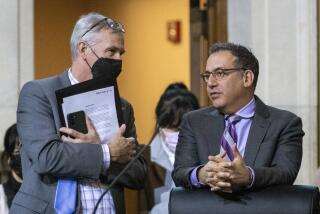HUNTINGTON BEACH : City Council OKs $177-Million Budget
Caught in the city’s tightest budget crunch in years, the City Council on Monday approved a $176.7-million spending plan for 1990-91 that includes a $2.35 increase in monthly trash fees and the construction of the city’s first police substation.
The council, however, rejected a proposed phone tax that would have raised an additional $500,000, despite City Administrator Michael T. Uberuaga’s lobbying in favor of the tax. It would have boosted the city’s annual income by more than $5 million, which he says will be needed in the next few years to avoid reducing city services.
The fee for curbside trash pickup was increased from $7.50 to $9.85 a month, to cover the city’s bill from Rainbow Disposal Co., Uberuaga said. The fee hike will begin July 1 and affects 43,500 residents.
If the fee was not raised, the city next year would pay about $1.2 million to subsidize trash collection costs, Uberuaga said.
By eliminating those city costs, the council freed money to pay for a police station in the crime-plagued Oak View area and help rebuild the municipal pier. The $800,000 of the new budget savings earmarked for the pier leaves the city still lacking about $4.4 million for the $12.7-million pier project, Uberuaga said.
The $443,000 Oak View plan, which will be funded by a combination of city and federal funds, will establish a police substation near Oak View elementary school to help combat drug and gang problems in the neighborhood.
The plan will also channel $15,000 toward the area’s community recreation center next to the school to expand the activities and services offered and establish on-site police patrolling. Although the center is credited with serving a vital role in the troubled neighborhood, residents say it also has become a haven for gangs and drug dealing.
The council on Monday also agreed to hire a consultant to review all city service fees to determine whether increases are warranted. Uberuaga says the city is collecting less for many services than it is paying for them.
The fee hikes are part of a set of guidelines the council passed Monday. Those guidelines, though non-binding, also restrict the council from dipping into reserve funds. Before starting a new program or project, the council must first determine how to pay for it.
More to Read
Sign up for Essential California
The most important California stories and recommendations in your inbox every morning.
You may occasionally receive promotional content from the Los Angeles Times.









